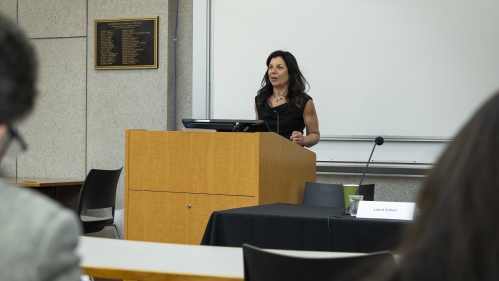
Criminal Law & Procedure
Background
Rutgers Law School is pleased to offer students the opportunity to participate in the Certificate Program in Criminal Law and Procedure. This program offers students with a special interest in the field of criminal law the opportunity to pursue that interest in a structured framework, and to achieve special recognition for doing so.
The program is designed to ensure that students: (1) are exposed to a broad range of issues in criminal law and procedure, (2) have the experience of writing a supervised research paper, and (3) obtain some practical experience in the field. The program is intended to be sufficiently flexible to allow students to pursue a particular sub-interest in substantive criminal law or criminal procedure.
Requirements
The program is open to all Rutgers students who have completed their first year of law school. To complete the certificate program, students are required to take the basic Evidence course plus an additional minimum of 15 credits in approved upper level criminal law and criminal procedure-related courses (that is, beyond the first year course in criminal law). To obtain the certificate, a student must have an overall GPA of 3.0 or higher in his or her criminal law and procedure courses at the time of graduation.
To earn the 15 credits, a student must complete Criminal Procedure: Investigation and Criminal Procedure: Adjudication and at least one course from each of the following two “baskets”: Upper level substantive criminal law (including seminars or courses in advanced topics in criminal law, computer crimes, confinement and reentry policy, domestic violence, juvenile justice, moral puzzles of criminal law, policing the city, wrongful convictions, international criminal law, white collar crime, political and corporate corruption law, punishment and sentencing, national security law); Practicums (criminal motion/pretrial practice; criminal trial presentation; criminal and youth justice clinic; and externships with local, state, and federal prosecutors, state and federal public defenders, and criminal court judges). Internships in private law offices would not ordinarily satisfy this requirement. [note that faculty supervision would be required for at least some externships] Additional courses may be added to this list with appropriate administrative approval, including possible cross-registration for courses offered in the Rutgers School of Criminal Justice.
The Law School will endeavor to offer students reasonable opportunities to satisfy the requirements of the certificate program. It should be understood, however, that resources are limited, and that the demands of the program will have to be balanced against other law school needs. Rising second year students who are interested in the program are advised to plan in advance to maximize their opportunity to satisfy certificate requirements.